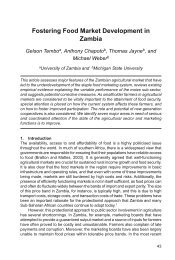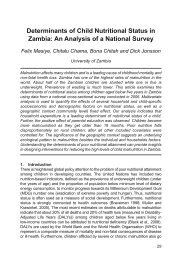Introduction to Basic Legal Citation - access-to-law home
Introduction to Basic Legal Citation - access-to-law home
Introduction to Basic Legal Citation - access-to-law home
You also want an ePaper? Increase the reach of your titles
YUMPU automatically turns print PDFs into web optimized ePapers that Google loves.
New Mexico: Supreme Court citation practice | <strong>Citation</strong> rule(s)<br />
210<br />
Contents | Index | Help | < | ><br />
Examples from Qwest Corp. v. N.M. Public Regulation Comm'n, 2006-NMSC-42,<br />
140 N.M. 440, 143 P.3d 478<br />
. . . .<br />
{20} Agencies are created by statute, and limited <strong>to</strong> the power and authority expressly granted<br />
or necessarily implied by those statutes. PNM Elec. Servs. v. Pub. Util. Comm'n, 1998-<br />
NMSC-17, 10, 125 N.M. 302, 961 P.2d 147. Statu<strong>to</strong>ry interpretation is a question of <strong>law</strong><br />
which we review de novo. Pub. Serv. Co. v. Pub. Util. Comm'n, 1999-NMSC-40, 14, 128<br />
N.M. 309, 992 P.2d 860. "Because statu<strong>to</strong>ry construction is outside the realm of the<br />
Commission's expertise, we afford little, if any, deference <strong>to</strong> the Commission on this matter."<br />
Id. (citation omitted). Our primary concern is <strong>to</strong> determine and give effect <strong>to</strong> legislative intent,<br />
looking first <strong>to</strong> the plain language of the statute. Id. 18. We hold that the New Mexico<br />
Telecommunications Act and the AFOR plan and order authorize the PRC's credit or refund<br />
incentive.<br />
. . . .<br />
{27} Qwest argues that there are statu<strong>to</strong>ry limits <strong>to</strong> the PRC's enforcement authority. The PRC<br />
"may apply <strong>to</strong> the district court for injunctions <strong>to</strong> prevent violations of any provision of the<br />
New Mexico Telecommunications Act . . . or of any rule or order of the [PRC] issued<br />
pursuant <strong>to</strong> that act," Section 63-9A-20, and "impose an administrative fine on a<br />
telecommunications provider for any act or omission that the provider knew or should have<br />
known was a violation of any applicable <strong>law</strong> or rule or order of the [PRC]," NMSA 1978, §<br />
63-7-23(B) (2000). Qwest argues that the PRC is limited <strong>to</strong> these two mechanisms <strong>to</strong> enforce<br />
Qwest's compliance. We refuse <strong>to</strong> so limit the PRC's regula<strong>to</strong>ry authority. The Legislature has<br />
given the PRC the discretion "<strong>to</strong> enforce [its] orders by appropriate administrative action and<br />
court proceedings." Section 8-8-4(B)(5) (emphasis added). Since the Legislature has<br />
implicitly authorized that the PRC create and enforce this incentive on Qwest, the incentive is<br />
an appropriate administrative action. We find that these statutes provide the PRC additional<br />
avenues <strong>to</strong> prevent violations of the New Mexico Telecommunications Act.<br />
. . . .<br />
{50} Section 8-8-4(B)(10) allows the PRC <strong>to</strong> adopt "reasonable administrative, regula<strong>to</strong>ry and<br />
procedural rules" <strong>to</strong> carry out its duties. Pursuant <strong>to</strong> this legislative directive, the PRC has<br />
passed rules <strong>to</strong> conduct hearings. A non-party is afforded the opportunity <strong>to</strong> comment on the<br />
record, "but such statement shall not be considered by the [PRC] as evidence." NMAC<br />
17.1.2.26(F) (2001). Regulations also allow a non-original party <strong>to</strong> intervene in a proceeding,<br />
NMAC 17.1.2.26(A), and if the intervention motion is granted, the entity has the same rights<br />
as original parties, NMAC 17.1.2.26(D)(7). Such rights include submitting proposed findings<br />
and conclusions, orders, and briefs. NMAC 17.1.2.38.<br />
. . . .




